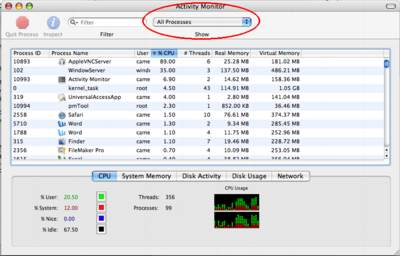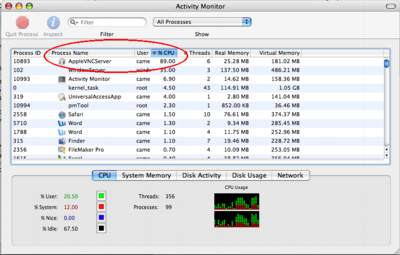How to clean your Mighty Mouse
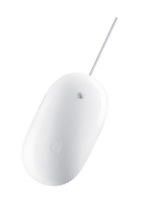
I
f your Mighty Mouse is covered in
fingerprints or its surface has become soiled, it can
be gently wiped with a clean lint-free cloth. If
necessary, moisten the cloth using only water, making
sure not to over saturate it. Be aware that the mouse
contains electronic components that may be damaged if
water drips from the cloth into the mouse via the
seam around the scroll ball or around its underside.
The same procedure can be used to clean the scroll
ball on your Mighty Mouse if it has become discolored
or dirty. Use a clean lint-free cloth lightly
moistened with water. Wipe the ball and the
surrounding area, making sure to rotate the ball
itself to ensure complete coverage. If the scrolling
feels rough or if the scroll ball isn't scrolling up,
down, or side-to-side, hold the mouse upside-down and
roll the ball vigorously while cleaning it to help
dislodge any particles that may have collected on the
internal hardware.
For a video demonstration, click here.
Monitor and Display Adapters
To identify a monitor or display adapter, compare
it to those shown below.
Note: For some adapters, the engineering part
number is stamped on the adapter.
Retail Part Number: 922-3424
Engineering Part Number: 590-1118-A
WhereWhere Used:
PowerBook G3 Series
PowerBook G3 Series (Bronze Keyboard)
MacBook Pro: Distorted video or no video issues
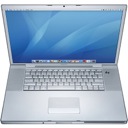
I
n July 2008, NVIDIA publicly acknowledged a higher than normal failure rate for some of their graphics processors due to a packaging defect. At that same time, NVIDIA assured Apple that Mac computers with these graphics processors were not affected. However, after an Apple-led investigation, Apple has determined that some MacBook Pro computers with the NVIDIA GeForce 8600M GT graphics processor may be affected. If the NVIDIA graphics processor in your MacBook Pro has failed, or fails within two years of the original date of purchase, a repair will be done free of charge, even if your MacBook Pro is out of warranty.
What to look for:
- Distorted or scrambled video on the computer screen
- No video on the computer screen (or external display) even though the computer is on
Specific products affected:
- MacBook Pro 15-inch and 17-inch models with NVIDIA GeForce 8600M GT graphics processors
- MacBook Pro (17-Inch, 2.4GHz)
- MacBook Pro (15-Inch, 2.4/2.2GHz)
- MacBook Pro (Early 2008)
- These computers were manufactured between approximately May 2007 and September 2008
If your MacBook Pro is exhibiting any of the symptoms listed above, please take it to an Apple Retail Store or an Apple Authorized Service Provider (AASP) for evaluation, or call your local Apple Contact Center. Before visiting the Genius Bar at the Apple Retail Store, please make a reservation.
Apple is issuing refunds to customers who may have paid for repairs related to this issue. Please contact Apple for details on the refund process.
Note: If your MacBook Pro is not experiencing any of these symptoms, you do not need to contact Apple.
MacBook Pro (15-inch): Noise under the keyboard
If your MacBook Pro (15-inch) emits a high-pitched
buzzing sound, please contact AppleCare for service.
Apple Portables: Tips for maximizing your battery charge
You can take some easy steps to prolong the charge
of your Apple portable's battery.
Here are some simple settings and steps you can take
to get the most out of your MacBook, MacBook Pro,
MacBook Air, iBook or PowerBook battery.
Optimize your battery settings in Energy Saver
preferences
- From the Apple menu, choose System Preferences.
- From the View menu, choose Energy Saver.
- Click Show Details.
- Choose Battery or Battery Power from the "Settings for" pop-up menu.
- Choose Longest or Better Battery Life from the Optimize Energy Settings pop-up menu.
These settings will put the hard disk to sleep whenever possible and reduce the computer's microprocessor performance in order to maximize its battery life. If you are using processor-intensive applications, you may wish to change these settings so the microprocessor performance is no longer reduced.
Set your screen brightness to the lowest comfortable level
Press the F1 (dimmer) and F2 (brighter) keys to dim the screen until the brightness is as low as possible and the screen is still comfortable to look at.
Turn off unused features and technologies.
Just as you would turn off the lights in an unoccupied room, turning off unused features and technologies can help maximize your battery life, too. Here are a few suggestions:
- Eject CDs and DVDs you're no longer using. Every so often, the optical drive spins up to read CDs or DVDs. This consumes a small amount of power.
- Disconnect peripherals when you're not using them. Connected peripherals, such as printers and digital cameras, can draw power from your battery even when you're not using them.
- Shut down any runaway applications.
If you're not in a location where you need to use AirPort or Bluetooth, you can turn them off to save power.
To turn off AirPort:
- From the Apple menu, choose System Preferences.
- From the View menu, choose Network.
- From the Show selection, choose Network Port Configuration.
- Uncheck Airport from the list.
- Click Apply Now.
To turn off Bluetooth in Mac OS X 10.2 or later:
- From the Apple menu, choose System Preferences.
- From the View menu, choose Bluetooth.
- Click the Settings tab.
- Click Turn Bluetooth Off.
Calibrating your computer's battery for best performance
You
can calibrate your iBook, PowerBook, MacBook, MacBook
Air, or MacBook Pro computer's lithium ion battery
for best performance.
The battery has an internal microprocessor that provides an estimate of the amount of energy in the battery as it charges and discharges. The battery needs to be recalibrated from time to time to keep the onscreen battery time and percent display accurate. With all iBooks and PowerBook G4 computers except the aluminum PowerBook G4 (15-inch Double-Layer SD), you should perform this procedure when you first use your computer and then every few months thereafter.
Read More...Runaway applications can shorten battery runtime
Battery runtimes can be reduced if an application(s) has run away or taken over system processes. This can cause the processor to work overtime and consume unnecessary battery power.
- Open the Activity Monitor (Applications/Utilities).
- Select the CPU tab as shown below.
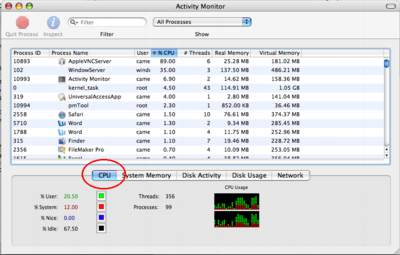
- Select All Processes in the pop-up menu:
- Select the "% CPU" column:
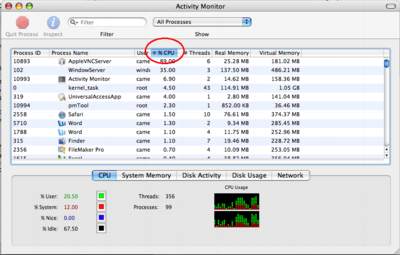
- Look for any application that has taken over the CPU:
If any process is taking more than 70% of the CPU, as shown above, verify if the process is needed. If not, quit the process by selecting the process and clicking the Quit button in the upper left corner of the window to regain CPU process control. This can lead to longer battery runtime.
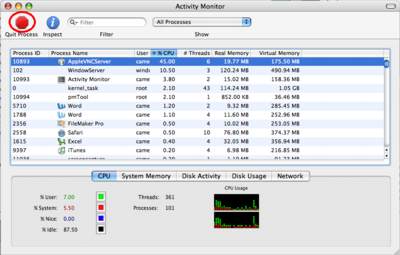
My Mac Cheat Sheet
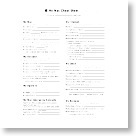
W
hether your Mac asks you for
certain information or you're seeking help from Apple
or an Apple Authorized Service Provider (AASP), there
may come a time when you need to have access to your
serial number, hardware configuration, passwords,
email server or internet access information. That's
when you discover that you've either forgotten or
misplaced this important information.
Don't worry, just refer to your Mac Cheat Sheet. To
make your Mac life a little easier, Apple has created
this handy cheat sheet to help you organize
often-asked and useful information about your Mac.
Select the PDF document link below, print it out,
fill in the fields with your information, and store
the Mac Cheat Sheet in a safe and secure place.
Download My
Mac Cheat Sheet PDF
Exchange files between InCopy and InDesign
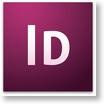
W
hen
you work with multiple applications in a single
workflow, it is advisable to standardize on a single
file format so that you can exchange files between
the applications. In a workflow with multiple
versions of Adobe InCopy and Adobe InDesign, the
Interchange (.incx) format is often the most
appropriate format since both InDesign and InCopy can
use it. This document explains how to export stories
in Interchange (.incx) format from InCopy CS3,
InDesign CS3, InDesign CS2, and InCopy CS2 so that
content can be exchanged between them.
Read
More...
DriveSavers 1st to Offer Recovery Services for Apple iPhone
A
s Time Magazine’s "Invention of
the Year," the iPhone is the most sophisticated
communication and data management device sold today;
but, like many digital devices, irreplaceable data
can be lost if the iPhone is damaged or not
synchronized while out in the field. At risk are
digital photos, address book contacts, calendar
entries, notes and downloaded music files. Until now,
"lost data" from iPhones was considered "lost
forever." Now DriveSavers, the worldwide leader in
data recovery services, has stepped into the
spotlight to offer the most technologically advanced
data recovery service to iPhone users—the first of
its kind in the industry.
Read More...
Creating Web Clip Widgets
L
eopard makes it easy
to create a Dashboard widget from a segment of a web
page. For example, you can capture a “new releases”
list from a media website, or the “latest posts”
field from an Internet discussion group. These Web
Clips appear, automatically updated, whenever you
open Dashboard.
Here’s an example, using www.macmusic.org,
a cool music software website. We navigated to their
home page in Safari and clicked the Web Clip button
(next to the address field).
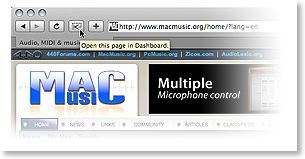
The
entire page darkens save for a bright rectangle. Drag
the rectangle from its center and edges until it
covers the segment you want to capture. Then click
Add and Safari sends your Web Clip to
Dashboard.
(If
Safari doesn’t display the Web Clip button, choose
Customize Toolbar in Safari’s View menu and add the
button to Safari’s toolbar.)
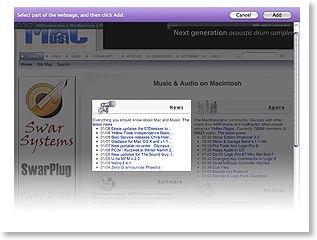
Now
the Web Clip appears as a new widget in Dashboard.
You can still edit it: Move your cursor over the
widget’s lower-right corner until a small letter i
appears. Click it to resize or reposition the
content, or customize its border using built-in
styles.
Hard drive crash? Need your data? We can save it!
Emc2 Computer
Solutions is an authorized partner in
DriveSavers' Reseller Program. Mention our Reseller
ID# DS17668 and receive a discount on
your data recovery!
DriveSavers has specialized in recovering lost data for 20 years and has the highest success rate in the industry. The company recovers data in as little as 24 hours from all operating systems and storage media including hard drives, RAID, disk arrays, servers, floppies, CD-ROM/DVD, backup tapes, flash memory, removable and magneto-optical cartridges. DriveSavers is authorized by all hard drive manufacturers to open sealed drive mechanisms without voiding the original warranty. They are known worldwide as the most trusted and respected company in the industry. Visit their web site at www.drivesavers.com to learn more or:
Call DriveSavers today to receive an immediate estimate: 800-440-1904
Apple Cinema Display (30-inch DVI) compatibility with Power Mac G5 & Mac Pro
- January 09, 2008
W
hen you connect an Apple Cinema Display (30-inch DVI)
to a Power Mac G5 or Mac Pro, you may find that the
highest available resolution is 1280 x 800, even
though the optimum resolution for the display is 2560
x 1600. The maximum resolution available when this
display is connected to a single-link DVI port is
1280 x 800 - you must connect the display to a
dual-link DVI port in order to access the higher
resolutions available to the display.
If this occurs, make sure that you are using a compatible video card for the display, and are connected to a dual-link DVI port on the card. Compatible video cards must include a dual-link DVI port. Refer to the table below for video cards compatibility:
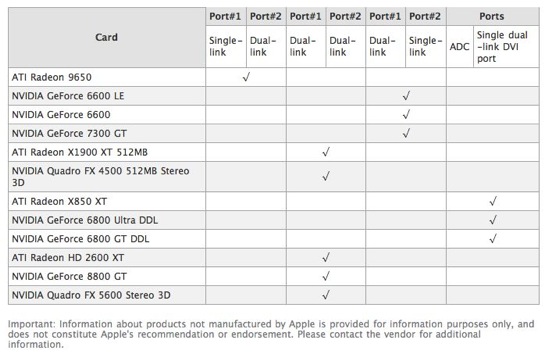
Why Use OpenType Fonts?
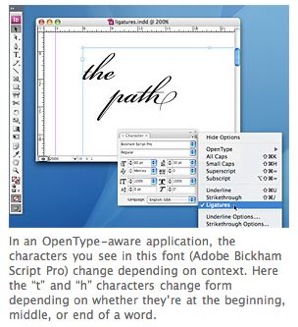 by David Blatner
by David Blatner
O
ne of the oldest myths in desktop
publishing is “never use TrueType fonts for
professional publishing.” Perhaps that was true in
the early 90’s, but there’s no reason to avoid them
now. However, there’s an even better type of font
format you should be using: OpenType. OpenType fonts
are great for a number of reasons:
They have just one file per font,
eliminating the need to manage separate screen and
printer font files.
They’re cross-platform — you can
use the same font on both Mac and PC.
They can contain thousands of
characters, so you no longer need separate expert
fonts.
They can contain intelligent
characters, such as automatic fractions, special
characters, and character pairs that change depending
on where they appear in a word (such as a swash
character).
They allow OpenType-aware
applications to follow special instructions inside
the font called glyph variants and automatically swap
out characters when relevant. For example, in a
script typeface, the application would be smart
enough to use one kind of “t” when it appears at the
beginning of a word and a different version when it’s
in the middle of a word (so that it smoothly attaches
to the letters around it). Applications that are not
OpenType-aware — such as older versions of
QuarkXPress or PageMaker — will still work with
OpenType fonts, but without the advanced glyph
features and intelligence.
Protect Those Precious Memories
Protect Those Precious Memories

As more people embrace the convenience of digital cameras, the potential for losing irreplaceable images continues to rise. Here are six safety tips to help protect those precious memories:
-
Transfer images from the camera and/or memory card onto CDs, DVDs or an external hard drive. Do this as soon as you've finished your picture taking session.
- Don't delete or reformat the memory card until all photos have been transferred and verified.
- Follow the instructions for removing the memory card from the camera or card reader connected to the computer to avoid deleting or corrupting photo images.
- Protect your memory card from static buildup or breakage by using a sturdy container when carrying the memory card around.
- Replace your memory card when necessary. After an average of 1,000 uses, the card can begin to wear out.
- Avoid extreme temperatures. Heat, cold and humidity can wreak havoc with all digital equipment, especially memory cards.
If you delete an image or images, get an error message or are unable to view images from the card, give us a call. Emc2 Computer Solutions is an authorized DriverSavers partner. DriveSavers was the first company to provide data recovery on digital camera flash memory cards, and remains the most successful!
Determining Battery Cycle Count
This tip describes how Mac users with portable computers running Mac OS X 10.4.x or later can determine the number of cycles on a battery.
- Open Apple System Profiler (Choose About this Mac from the Apple menu and then click on the More Info button).
- Click Power in the Contents list (under the Hardware section as seen below).
- Cycle Count is listed under the Battery
Information section.
Notes
-
A properly maintained Apple notebook battery is designed to retain up to 80 percent of its original capacity after 300 full charge and discharge cycles.
-
A charge cycle means using all of the battery’s power, but that doesn’t necessarily mean a single charge. For instance, you could use your notebook for an hour or more one day, using half its power, and then recharge it fully. If you did the same thing the next day, it would count as one charge cycle, not two, so you may take several days to complete a cycle.
-
Searching Just Your Bookmarks
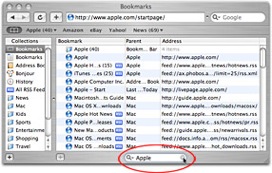
If you’re trying to search for a particular bookmark, you’ll want to know this trick: First, click on the Show All Bookmarks icon in the top-left corner of the Bookmarks Bar. Doing this makes the Collections column visible on the left side of Safari, but more importantly, it adds a Search field at the bottom center of the Safari window. When you type search terms in this field, it searches just within your bookmarks, so you get super-fast results.
Iced Chip Tips
Cold weather can wreak havoc on temperature-sensitive drives inside computer games, portable music devices and digital cameras. Condensation and expanding components can lead to drive failure and data loss. If you leave any such items in the car overnight, be sure to let it sit at room temperature for 8-10 hours before powering up!
Top 30 Mistakes Made By New Mac Users When Switching From Windows
-
Closing an application window, thinking it has quit.
-
Downloading an app and running it from the disk image.
-
Creating endless untitled folders.
-
Using Safari’s Google search to get to a website.
-
Confusing the concept of wallpaper with screensaver.
Mac OS: Versions, builds included with Intel-based Macs
Important: You cannot normally use a Mac OS version earlier than the one included with the computer.
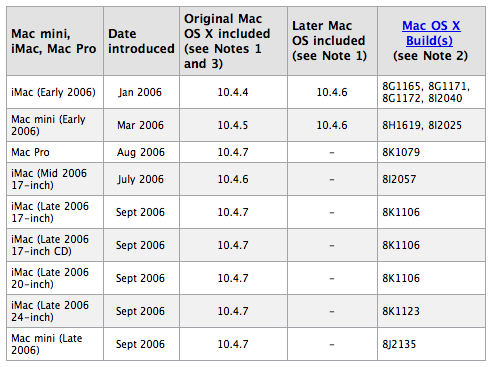
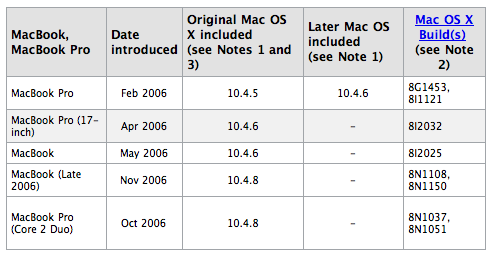

Notes
-
"Some computers shipped with different Mac OS X versions at different times. When a computer was not bundled with a later version, a "-" appears in the "Later Mac OS included" column.
-
The build information is available in the About This Mac window.
-
Some Macs may include a slightly later build version (but same numbered version) of Mac OS X on the Install or Restore discs than was preinstalled on the computer.
Mac OS X: About This Mac "build" information
Learn about build versions, such
as "Build 8L127," which appear in the About This
Mac window and System Profiler.
The
build version you see depends on the version of Mac
OS X that you have installed. The version changes
when you use the Software Update feature to update
core system software.
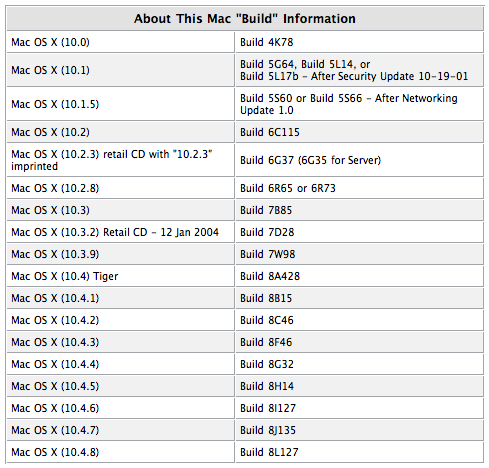
Burning Multiple Times to the Same CD
G
enerally, when you burn files to a
CD once, you’re done — you can’t burn to that CD
again. Unless you use this little trick: First
create a new folder and give it a descriptive name
(something like “burn baby burn!” Kidding). Now put
the files you want to burn into that folder, then
go to the Applications folder and open the
Utilities folder. Double-click on Disk Utility.
When it comes up, go under the File menu, under
New, and choose Disk Image from Folder, and then
when the Open dialog appears, find that folder with
the stuff you want to burn and click the image
button. A Save dialog appears in which you can
leave the name as is or choose a new name (leave
the other controls alone), and then click Save. In
a few moments, a disk image of your folder’s
contents will appear in the list on the left side
of the Disk Utility dialog. Click on that icon, and
then click the burn button at the top left of the
Disk Utility dialog.
When you click the Burn button, a dialog will
appear asking to insert a disc. Do so, and then
click once the blue downward-facing triangle on the
right side of this dialog to show more options.
Click on the checkbox for Leave disc appendable,
then click the Burn button. Your data will now be
written to that CD. To add more files later, just
insert that same CD and then you’ll use this same
process all over again, but when you get to that
final burn dialog, the button won’t say “Burn” this
time, instead it will say “Append” because you’re
adding these files to the same disc. By the way,
don’t forget to remove the files you already burned
to this disc from your “burn baby burn!” folder
(and the DMG file it creates) before you make your
next disc image.
Mac OS X: About This Mac window provides computer serial number
You
can use the About This Mac window to find your
computer's serial number when started up from Mac
OS X 10.1 or later.
Follow these
steps:
Choose About This Mac from the Apple Menu.
Double-click the version text,
for example "Version 10.1".
Your computer's serial number now
appears where the version text had been.
Note: Some earlier Mac OS X-compatible computers do
not have their serial numbers stored in a way that
allows this feature to work.
Lack of this feature on your computer does not indicate any software or hardware failure.
How to change the volume on your Mac without that little sound
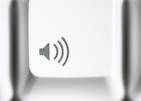
D
epending on the type of keyboard
you have, you may be able to use the volume keys on
your keyboard (the ones with a speaker icon) to
change the volume of your computer’s speakers. When
you press one of these keys, normally you hear the
alert sound play to let you hear the new volume. If
you want, you can prevent the alert sound from
playing when you change the volume.
To turn off the volume keys’ sound feedback, choose
Apple menu > System Preferences and click Sound.
Click Sound Effects and deselect the “Play feedback
when volume keys are pressed” checkbox.
To temporarily turn off the volume keys’ sound
feedback, hold down the Shift key when you press a
volume key. Not all keyboards have volume keys. If
you don’t see keys with speaker icons, you cannot
change your computer’s volume using your
keyboard.
Where Did That Download Come From?
If
you download a file from the web, you can usually
find out exactly where that downloaded file came
from (including the exact web address) by pressing
Command-I when you have the file selected.
Once the info dialog appears, click on the
right-facing arrow beside More Info to expand that
panel and it will display a Where from header, and
to the right of that it will show the exact web
address from which the file was originally
downloaded.
The best keyboard Apple ever made rises again.
The Matias Tactile Pro Keyboard is built from the same premium keyswitch technology that Apple used in its original Apple Extended Keyboard, widely viewed as the best keyboard Apple ever made.
Read More...

